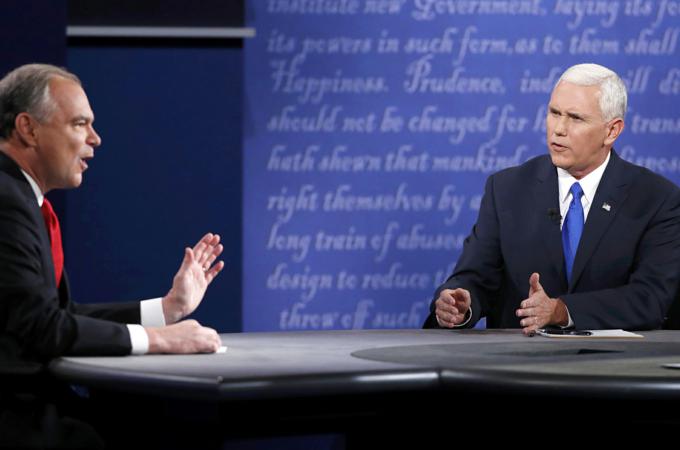Abortion, the debates, and truth
I wish to analyze with you the exchange between Tim Kaine and Mike Pence on abortion at the Vice Presidential debate this week.
Let us first recognize how extraordinary it was that that portion of the debate took place at all. We are now 50 years after the sexual revolution and 40 years after Roe v Wade. Over those years, the media, the courts, the universities, and the Democratic Party have promoted "a woman's right to choose" without significant dissent. Major religious groups have defected to this view, such as mainline Protestantism and self-proclaimed "liberal" Catholics. In contrast, the pro-life view has been nourished solely in families and some church communities. And yet it has grown so strong that a Presidential ticket proudly declares itself pro-life, not even believing that to do so is to accept a political loss.
"Abortion kills twice. It kills the body of the baby and it kills the conscience of the mother," St. Mother Teresa said. We should lament dearly those 100 million deaths to body and soul since Roe v Wade, but also rejoice and take consolation in the reality of truth. We Catholics live for truth.
It is true that there is a right to life and that its existence is not an object of religious faith. "All men are created equal, that they are endowed by their Creator with certain unalienable Rights, that among these are Life, Liberty and the pursuit of Happiness" -- this comes not from the Catechism but from the foundational text of the American Republic, the Declaration of Independence. Tim Kaine says he endorses Jefferson's concept of freedom, but those words were written by Jefferson.
The Declaration puts together life and liberty. As regards liberty, it makes no sense to say "I am personally opposed to affronts to liberty, such as slavery, but I will not impose that view on others." Likewise, as regards life, which is a prior right, it makes no sense to say, as Tim Kaine did, "I am personally opposed to affronts to life, such as abortion, but I will not advance that view through law."
There are some values which are such that they really cannot be honored only for oneself. "I will not throw garbage into the Grand Canyon but I do not oppose others' throwing garbage into it." "I personally oppose killing endangered African lions, but I will not stop others from killing them." "I personally will do nothing to pollute the environment but I simply trust others not to pollute it." This is all nonsense.
Lincoln saw when he debated slavery that to combat that sort of nonsense it was essential to bring in the viewpoint of the slave, which was tricky, because few people could identify with slaves. But he said, memorably, that the notion of "Popular Sovereignty" was that "if one man should enslave another man, no third man should object." Likewise Tim Kaine's "right to choose" is that if one man should kill another man, no third man should object.
You cannot protest that I've used the incendiary language of "killing" here, because Tim Kaine is "personally opposed." And he's opposed because it's killing, right? Why else would he be opposed? Thus he really does think that in abortion one man can kill another and no third man should object.
So abortion is contrary to the Declaration of Independence and represents a violation of fundamental rights. It is not an inherently religious matter, and those who oppose it are not trying to impose their "faith" on others.
Mike Pence knows all of these things, but it is telling that in the debate he took a different approach. He avoided entirely the language of rights, I suspect because he recognizes that people become inflamed with anger (rightly) when they are trying to defend what they regard as a right. Also, violations of right in principle should be protected by law, and all law (unavoidably) involves the potential for coercion, which is unpleasant and unwelcome. Thus he took the sort of friendly and positive approach that the pro-life movement has embraced over the years. You catch more flies with honey than with vinegar.
Instead of stridently quoting the Declaration, he gently affirmed, "a society can be judged by how it deals with its most vulnerable, the aged, the infirm, the disabled, and the unborn. I believe it with all my heart." He appealed to a compassionate Biblical outlook rather than a legal document --"that ancient principle, where God says 'before you were formed in the womb, I knew you.'" He pleaded that the babies tossed aside in abortion be placed instead in adoption.
But like Lincoln he did introduce the viewpoint of the human being affected by abortion. Pro-choice Kaine is implacably set against any choice for the baby killed while coming out of the womb in partial birth abortion. Again, the language was soft and indirect but the upshot unmistakable: "What I can't understand is with Hillary Clinton and now Senator Kaine at her side is able to support a practice like partial-birth abortion. ... the very idea that a child that is almost born into the world could still have their life taken from them is just anathema to me." Not a few viewers will Google "partial birth abortion" and decide whether that's anathema to them also, and wonder what "choice" could mean to someone who defends it.
- Michael Pakaluk is Professor of Ethics and Social Philosophy in the Busch School of Business at The Catholic University of America. His book on the gospel of Mark, ‘‘The Memoirs of St. Peter,’’ is available from Regnery Gateway.



















